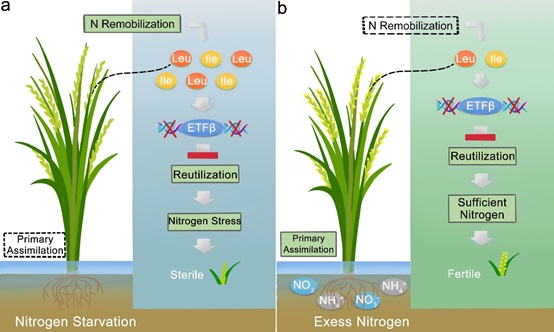Meiosis is the critical step in sexual reproduction. As the primary determinant of meiosis, its initiation is cooperatively controlled by the genetic makeup of the cell and environmental cues.
Nitrogen is quantitatively the most important plant nutrient. Nitrogen deficiency often leads to the reduced fertility in plants. However, the effects of nitrogen nutrition on meiosis is poorly understood.
Recently, a research group led by Prof. CHENG Zhukuan at the Institute of Genetics and Developmental Biology (IGDB) of the Chinese Academy of Sciences (CAS) shed new light on the impact of nitrogen nutrition on plant meiosis initiation.
Researchers identified a new meiosis initiation regulatory gene in rice (Oryza sativa) by map-based cloning, ELECTRON TRANSFER FLAVOPROTEIN SUBUNIT β (ETFβ). ETFβ is involved in branched amino acid (BCAA) metabolism and energy supply.
Interestingly, the researchers found that etfβ was a nitrogen-dependent meiotic entrance mutant. Under nitrogen starvation, etfβ cannot initiate meiosis normally, and displays complete sterility, which can be perfectly rescued by applying excess exogenous inorganic nitrogen.
Gene expression analysis suggested that transcription of ETFβ could be induced by low nitrogen stress. The co-analysis of metabolomics analysis and total nitrogen contents data revealed that under nitrogen starvation, metabolic abnormalities of BCAAs in etfβ bringing about impaired nitrogen reutilization, and nitrogen deficiency in spikelets led to sterility. However, in an environment with sufficient nutrition, the nitrogen demands of etfβ panicles could be met by exogenous nitrogen, instead of heavily dependent on ETFβ, and etfβ recovered fertility.
This study demonstrated that ETFβ contributed to ensuring meiotic initiation by promoting nitrogen reutilization under nitrogen starvation, which could be a safeguard mechanism for plants to maintain fertility in poor soil.
This research was sponsored by the Strategic Priority Research Program of Chinese Academy of Sciences, and the National Natural Science Foundation of China.
The relevant study was published in Nature Communications (https://doi.org/10.1038/s41467-022-28173-3) on January 25, 2022.
Proposed model of ETFβ function (Image by Han Yang).
Contact:
Dr. CHENG Zhukuan
Institute of Genetics and Developmental Biology, Chinese Academy of Sciences
Email: zkcheng@genetics.ac.cn
 Proposed model of ETFβ function (Image by Han Yang).Contact:Dr. CHENG ZhukuanInstitute of Genetics and Developmental Biology, Chinese Academy of SciencesEmail: zkcheng@genetics.ac.cn
Proposed model of ETFβ function (Image by Han Yang).Contact:Dr. CHENG ZhukuanInstitute of Genetics and Developmental Biology, Chinese Academy of SciencesEmail: zkcheng@genetics.ac.cn CAS
CAS
 中文
中文




.png)
